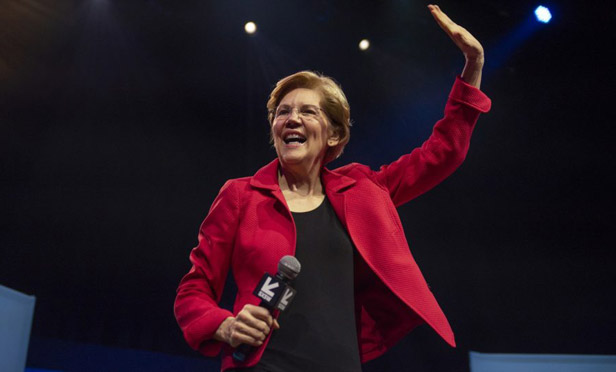
Estimates from outside the Warren camp have put the cost of her proposed Medicare-for-All plan at as high as $34 trillion over 10 years, but Senator Elizabeth Warren, D-Mass., herself has finally released details on how the plan would be paid for, and she puts the cost at $20.5 trillion.
CNN reports that the Warren estimate comes through the assistance of "prominent economists and health policy experts" who "reached that figure in large part by requiring state and local government to continue paying the $6 trillion they now spend on Medicaid, the Children's Health Insurance Program, and public employee premiums." The projection also assumes lower administrative costs, lower drug prices, and a resulting lower economy-wide total for healthcare spending.
Critics of Medicare-for-All in general—including some Democrats, like former vice president Joe Biden—have been saying that the proposed program, whether from Warren or from Senator Bernie Sanders, I-Vt., is too costly and can't succeed. And Warren was coming in for criticism for not having released a plan to pay for her Medicare-for-All proposal.
But the plan is now out, and Warren says that, unlike one of the claims by critics, the middle class will not be subject to higher taxes under her plan. Instead, states, employers, large businesses, Wall Street, and the wealthy will be on the hook for the cost of the program, the report says, with billionaires coming in for an additional tax on their net worth.
"My transition plan will take seriously and address substantively the concerns of unions, individuals with private insurance, hospitals, people who work for private health insurers, and medical professionals who worry about what a new system will mean for them," Warren said.
A four-year transition program would require employers to fork over what they now pay to insurers to the federal government instead, an estimated $8.8 trillion over 10 years as an "Employer Medicare Contribution."
In addition, billionaires would have to cough up three cents per dollar on net worth higher than $1 billion—on top of Warren's earlier proposed wealth tax of 3 percentage points on billionaires. And the richest one percent would also get taxed on capital gains annually instead of at the time of sale, at a higher capital gains rate that would match income taxes. These measures are estimated to raise $3 trillion.
The IRS would be empowered to go after tax fraud and tax evasion by the wealthy, projected to raise another $2.3 trillion.
The financial sector and large corporations would be subject to a financial transaction tax of 0.01 percent on the sale of stocks, bonds and derivatives, as well as to significantly changed corporate tax law—projected to raise another $1.4 trillion.
Comprehensive immigrant reform would bring in another $1.2 trillion in tax revenue from employed immigrants, who would also boost the population. Warren would also eliminate the Pentagon's Overseas Contingency Operations fund and directing that money to Medicare for All.
And last but far from least, employees who would no longer have to pay their share of healthcare premiums would see an increase in their take-home pay—which would then be taxed to raise an additional $1.4 trillion.
In addition to her own team, Warren relied on four other experts to come up with the numbers: Simon Johnson, former chief economist at the International Monetary Fund (IMF); Mark Zandi, the chief economist at Moody's Analytics; Betsey Stevenson, a former member of the Council of Economic Advisers under Barack Obama; and Don Berwick, who served as an administrator of the Centers for Medicare and Medicaid Services in the Obama administration.
Berwick, for his part, wrote in a USA Today op-ed that assertions by the opposition of higher costs and taxes are wrong. Berwick wrote, "The truth is the opposite. Medicare-for-All would sharply reduce overall spending on healthcare. It can be thoughtfully designed to reduce total costs for the vast majority of American families, while improving the quality of the care they get."
And even other economists are weighing in on the criticism of the opposition that taxes will go up even for the middle class. In an opinion piece in The Guardian, Emmanuel Saez and Gabriel Zucman, economics professors at the University of California, Berkeley, asserted that "[n]ot only would universal healthcare reduce taxes for most people, it would also lead to the biggest take-home pay raise in a generation for most workers."
From: BenefitsPro
© Touchpoint Markets, All Rights Reserved. Request academic re-use from www.copyright.com. All other uses, submit a request to [email protected]. For more inforrmation visit Asset & Logo Licensing.



